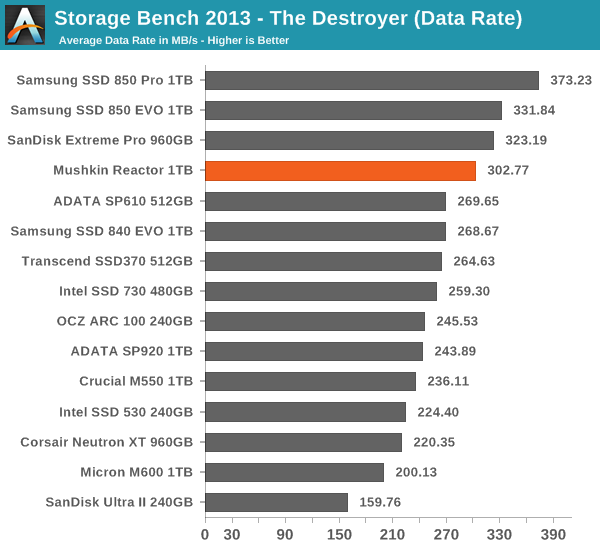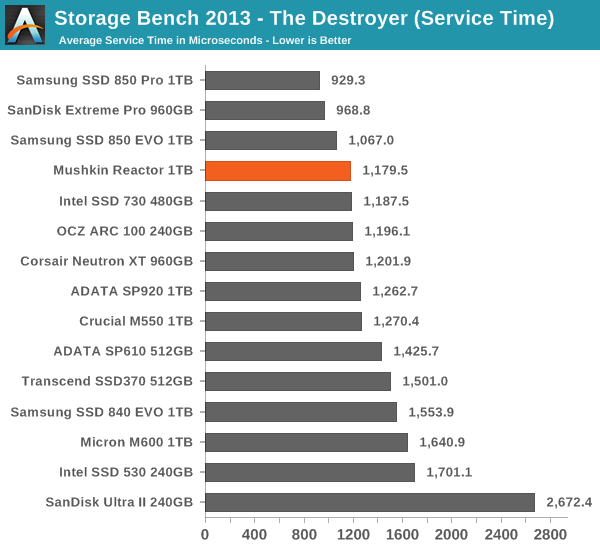Mushkin Reactor 1TB SSD Review
by Kristian Vättö on February 9, 2015 11:32 AM EST- Posted in
- Storage
- SSDs
- Mushkin
- Silicon Motion
- SM2246EN
- Reactor
- Micron 16nm
AnandTech Storage Bench 2013
Our Storage Bench 2013 focuses on worst-case multitasking and IO consistency. Similar to our earlier Storage Benches, the test is still application trace based – we record all IO requests made to a test system and play them back on the drive we are testing and run statistical analysis on the drive's responses. There are 49.8 million IO operations in total with 1583.0GB of reads and 875.6GB of writes. I'm not including the full description of the test for better readability, so make sure to read our Storage Bench 2013 introduction for the full details.
| AnandTech Storage Bench 2013 - The Destroyer | ||
| Workload | Description | Applications Used |
| Photo Sync/Editing | Import images, edit, export | Adobe Photoshop CS6, Adobe Lightroom 4, Dropbox |
| Gaming | Download/install games, play games | Steam, Deus Ex, Skyrim, Starcraft 2, BioShock Infinite |
| Virtualization | Run/manage VM, use general apps inside VM | VirtualBox |
| General Productivity | Browse the web, manage local email, copy files, encrypt/decrypt files, backup system, download content, virus/malware scan | Chrome, IE10, Outlook, Windows 8, AxCrypt, uTorrent, AdAware |
| Video Playback | Copy and watch movies | Windows 8 |
| Application Development | Compile projects, check out code, download code samples | Visual Studio 2012 |
We are reporting two primary metrics with the Destroyer: average data rate in MB/s and average service time in microseconds. The former gives you an idea of the throughput of the drive during the time that it was running the test workload. This can be a very good indication of overall performance. What average data rate doesn't do a good job of is taking into account response time of very bursty (read: high queue depth) IO. By reporting average service time we heavily weigh latency for queued IOs. You'll note that this is a metric we have been reporting in our enterprise benchmarks for a while now. With the client tests maturing, the time was right for a little convergence.

The Reactor does very well in our 2013 Storage Bench and is only beaten by the more expensive SanDisk and Samsung. Among the more value-oriented 1TB SSDs, the Reactor seems to be taking the lead.











69 Comments
View All Comments
Shadowmaster625 - Friday, February 13, 2015 - link
That's because SSDs are old and antiquated. NAND should be right on the DIMMs with DRAM, sharing the same bus, the same memory controller, as much of the same hardware as possbile. It should have started 3 years ago and by now we should have had 4GB DRAM + 64GB NAND DIMMs for $120 a pair and 8GB + 128GB for $200 a pair.akrobet - Monday, February 9, 2015 - link
What is holding back the adoption of NVMe M.2 drives?AnnihilatorX - Monday, February 9, 2015 - link
I think: Lack of Chipset support, require most recent OSes, lack of boot support, competing standards -> general consumer confusion (SATA Express vs M.2), Rarity of motherboards with M.2, cost.There is not one specific reason holding back, but I guess you can just say with all new tech adoption will be low at first, and this would be the explanation.
galta - Monday, February 9, 2015 - link
I boot with my Plextor M.2dgingeri - Monday, February 9, 2015 - link
The M6e doesn't do NVMe. It's AHCI, which restricts performance somewhat.BillyONeal - Monday, February 9, 2015 - link
The article says that you don't think the 850 EVO is worth 60 dollars more; but in the list they're the same price. Typo?Kristian Vättö - Monday, February 9, 2015 - link
Read the full sentence."That said, if the prices go up to $450 again, the Reactor will become a better choice because despite the performance and features I don't find the 850 EVO to be worth $60 more."
Kristian Vättö - Monday, February 9, 2015 - link
I also edited it to be more clear now.BillyONeal - Monday, February 9, 2015 - link
Makes sense. Thanks!Andy Chow - Monday, February 9, 2015 - link
A 1TB drive with 144 TB endurance? No thanks!